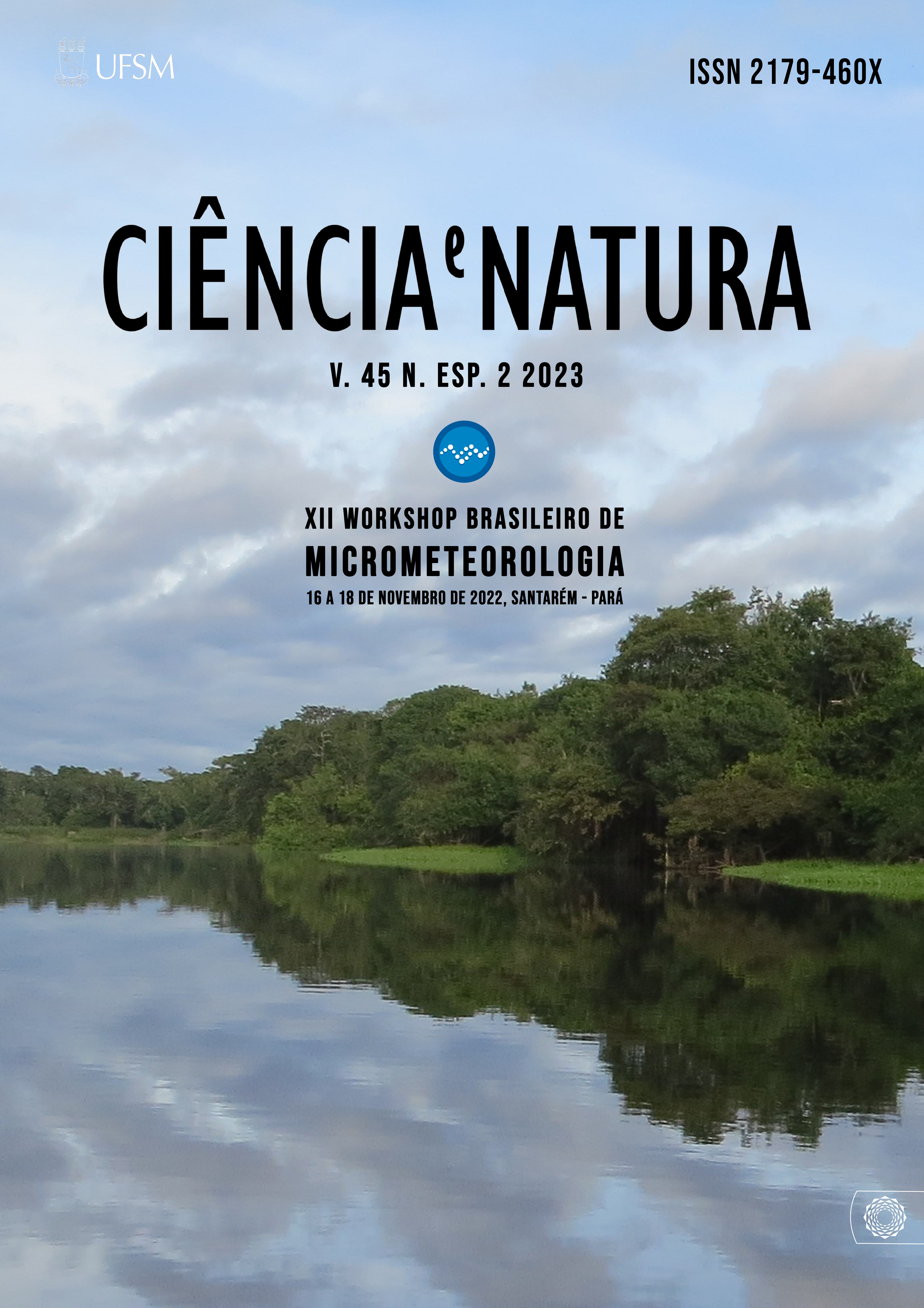Investigação de eventos de drenagem de ar frio durante a noite sobre terreno ondulado
DOI:
https://doi.org/10.5902/2179460X77188Palavras-chave:
Escoamento de ar frio, Superfície inclinada, Condições estáveisResumo
O propósito do trabalho é investigar a possibilidade de ocorrência de escoamentos de drenagem de ar frio sobre um terreno ondulado com cobertura de gramado. Este tipo de relevo e cobertura de superfície é tipicamente encontrado no bioma do Pampa, que abrange o sul do Brasil, Uruguai e Argentina. Escoamentos de drenagem de ar frio, tem sido reportado na literatura, e parecem ocorrer em diversas escalas espaciais de topografia. Sob condições estáveis da atmosfera, massas de ar frio se formam sobre a superfície, e se o relevo for complexo, a força peso delas podem exceder o gradiente local de pressão. Nesse tipo de situação o ar frio tende a descer nos locais onde a superfície é inclinada, e se acumular nas partes baixas do terreno. Na investigação são analisados dados de temperatura, velocidade do vento, e radiação de onda longa coletados e uma torre micrometeorológica. Em diversas ocasiões são observados períodos nos quais o escoamento mais próximo da superfície (alturas inferiores a 4 m) segue a direção de queda do terreno, enquanto em níveis mais elevados direções diferentes. Estes eventos possuem velocidades inferiores a 1 ms-1 e acontecem quando o vento no topo da torre é fraco (< 4 ms-1).
Downloads
Referências
AMANATIDIS, G. et al. Evidence of katabatic flows deduced from a 84 m meteorological tower in Athens, Greece. Boundary-Layer Meteorology, Springer, v. 58, n. 1-2, p. 117–132, 1992. DOI: https://doi.org/10.1007/BF00120754
ANDRADES, F. M. Escoamento de drenagem na camada limite planetária estável. 2019. 89f Dissertação (Mestrado em Engenharia) — Universidade Federal do Pampa, Alegrete, 2019.
FITZJARRALD, D. R. Slope winds in Veracruz. Journal of Climate and Applied Meteorology, American Meteorological Society, v. 25(2), 133 -144. DOI: https://doi.org/10.1175/1520-0450(1986)025<0133:SWIV>2.0.CO;2
MAHRT, L. et al. Shallow drainage flows. Boundary-layer meteorology, Springer, v. 101, n. 2, p. 243–260, 2001. DOI: https://doi.org/10.1023/A:1019273314378
STAEBLER, R. M.; FITZJARRALD, D. R. Observing subcanopy co2 advection. Agricultural and Forest Meteorology, Elsevier, v. 122, n. 3-4, p. 139–156, 2004. DOI: https://doi.org/10.1016/j.agrformet.2003.09.011
TÓTA, J. et al. Amazon rain forest subcanopy flow and the carbon budget: Santarém lba-eco site. Journal of Geophysical Research: Biogeosciences, Wiley Online Library, v. 113, n. G1, 2008. DOI: https://doi.org/10.1029/2007JG000597
Downloads
Publicado
Como Citar
Edição
Seção
Licença
Copyright (c) 2023 Ciência e Natura

Este trabalho está licenciado sob uma licença Creative Commons Attribution-NonCommercial-ShareAlike 4.0 International License.
Para acessar a DECLARAÇÃO DE ORIGINALIDADE E EXCLUSIVIDADE E CESSÃO DE DIREITOS AUTORAIS clique aqui.
Diretrizes Éticas para Publicação de Revistas
A revista Ciência e Natura está empenhada em garantir a ética na publicação e na qualidade dos artigos.
A conformidade com padrões de comportamento ético é, portanto, esperada de todas as partes envolvidas: Autores, Editores e Revisores.
Em particular,
Autores: Os Autores devem apresentar uma discussão objetiva sobre a importância do trabalho de pesquisa, bem como detalhes e referências suficientes para permitir que outros reproduzam as experiências. Declarações fraudulentas ou intencionalmente incorretas constituem comportamento antiético e são inaceitáveis. Artigos de Revisão também devem ser objetivos, abrangentes e relatos precisos do estado da arte. Os Autores devem assegurar que seu trabalho é uma obra totalmente original, e se o trabalho e / ou palavras de outros têm sido utilizadas, isso tem sido devidamente reconhecido. O plágio em todas as suas formas constitui um comportamento publicitário não ético e é inaceitável. Submeter o mesmo manuscrito a mais de um jornal simultaneamente constitui um comportamento publicitário não ético e é inaceitável. Os Autores não devem submeter artigos que descrevam essencialmente a mesma pesquisa a mais de uma revista. O Autor correspondente deve garantir que haja um consenso total de todos os Co-autores na aprovação da versão final do artigo e sua submissão para publicação.
Editores: Os Editores devem avaliar manuscritos exclusivamente com base no seu mérito acadêmico. Um Editor não deve usar informações não publicadas na própria pesquisa do Editor sem o consentimento expresso por escrito do Autor. Os Editores devem tomar medidas de resposta razoável quando tiverem sido apresentadas queixas éticas relativas a um manuscrito submetido ou publicado.
Revisores: Todos os manuscritos recebidos para revisão devem ser tratados como documentos confidenciais. As informações ou ideias privilegiadas obtidas através da análise por pares devem ser mantidas confidenciais e não utilizadas para vantagens pessoais. As revisões devem ser conduzidas objetivamente e as observações devem ser formuladas claramente com argumentos de apoio, de modo que os Autores possam usá-los para melhorar o artigo. Qualquer Revisor selecionado que se sinta desqualificado para rever a pesquisa relatada em um manuscrito ou sabe que sua rápida revisão será impossível deve notificar o Editor e desculpar-se do processo de revisão. Os Revisores não devem considerar manuscritos nos quais tenham conflitos de interesse resultantes de relacionamentos ou conexões competitivas, colaborativas ou outras conexões com qualquer dos autores, empresas ou instituições conectadas aos documentos.






